Mike Flanagan is back with another thoughtful, sometimes gut-wrenching adaptation of classic horror! And this one’s mostly just gross, bloody, visceral, eat-the-rich-type fun!
Mostly.
While I think Midnight Mass and Doctor Sleep are still tied for my favorite Flanagan, I really enjoyed The Fall of The House of Usher. It’s a much tighter story than the two Haunting series, unspooling over eight episodes and dotting some big questions among scenes of over-the-top violence. There are only a few jump scares, and I think I only spotted maybe two Hidden Ghosts? But maybe I missed some. I’m not going to spoil much here (but also the show gives its basic structure away quite early in episode one) so if you want to go in completely cold I’d say go watch first.
The Usher family is very, very rich, and very influential, and they’ve built their empire on the questionable foundation of pharmaceuticals. Opioids, to be more specific. Roderick Usher has six kids from five different women. His twin Madeline has used the family’s vast fortune to develop a tech arm for the company that is stretching the limits of AI. Roderick has recently married a much younger woman who is functional largely because of the family’s signature opioid, Ligodone, and the kids aren’t too happy about that potential unbalancing of the Will. But the kids have their own problems: As is Usher tradition, at a certain point in your youth you are given a preposterously large chunk of money, and you are expected to use it to found some new company or investment. If Roderick and Madeline approve, that becomes your contribution to the Usher legacy. If they don’t like your idea, or it fails, then your already-tenuous, extremely competitive relationships with your siblings just got much worse.
Over the course of the eight episodes, we see the results of the Usher kids’ work, but… none of it really matters. They’re all doomed, you see, because of the terrible actions of Roderick and Madeline a generation earlier. And that’s where this show gets fun.
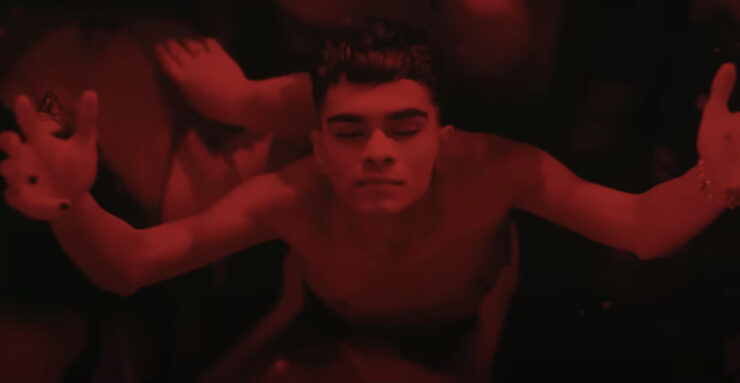
This is another in a line of media that are dealing with extremely rich people. Like Succession, Glass Onion, The Menu, Triangle of Sadness, the fun comes in two very different ways: First, us poors get to bask in the lifestyles these people create. Each Usher has a very particular vibe, fashion, interior design aesthetic, and kink, and they revel in that shit for the first few episodes. But then there’s that other fun, the fun where we watch them suffer and come to bad ends. And this is where Usher surpasses Succession in my black little Hot Topic heart. Because by adding Poe’s bleak worldview to this kind of thing, we get some really grand guignol comeuppances. We gets riffs and mash-ups of everything from “The Murders in the Rue Morgue” (with a delightful pun added that I won’t spoil) to “The Black Cat”, to “The Pit and the Pendulum”, to a deeply nasty update on “The Tell-Tale Heart”, to, of course, “The Fall of the House of Usher” itself. Names and character traits from Poe’s work are woven into the whole show, and there are also some fun Easter eggs from his real life hidden away. As you can tell just from the episode titles, Flanagan and the writing team are running amok in Poe’s work. Scenes from Rue Morgue butt up against references to the romantic poem Annabel Lee. The Raven appears in many different guises. The Tell-Tale Heart throbs through about half the season, really, before it gets serious. Pym is not entirely as he seems. (If you want to tease out all the references and mash-ups, here’s not a raven but a Vulture article.)
And added to that is that, since this is a Flanagan show, part of the fun is pointing at the TV and saying “Wait, that’s ___!!!” every few minutes. The show’s structure gives each member of Flanagan’s company a turn to shine. Most of the Midnight Club Kids are here, Kyliegh Curran from Doctor Sleep is here as Lenore, Katie Siegel is here as Camille, I think Rahul Kohli’s in here as Napoleon but I passed out every time the man walked on screen so I can’t be positive. Henry Thomas is delightful as eldest boy Frederick, and Samantha Sloyan is actually a little less evil than usual as eldest daughter Tamerlane. T’Nia Miller might get the best showcase of all in the Tell-Tale Heart episode, but Sauriyan Sapkota gets to host the Masquerade of the Red Death as youngest son Prospero (and his episode features an amazing remix of “Wicked Game” and thus wins a special place in my own heart). Carla Gugino knocks every incarnation of Verna out of the park, er, graveyard? Bruce Greenwood is older Roderick, grave and wry and shattered, and Matt Saracen Zach Gilford is young Roderick, still with a glimmer of humanity in there. Willa Fitzgerald as young Madeline and Mary McDonnell as older Madeline create a beautiful steel spine for the character as she ages and becomes ever more herself. Carl Lumbly is bristling with righteous anger as older C. Auguste Dupin, and Malcolm Goodwin is heartbreakingly optimistic as Dupin the young idealist. And then there’s Mark Hamill as Arthur Pym, giving a performance that made me clap like a happy child every time his character appeared. (It’s so good, really, if you watch the show or know other reason, just do it to bask in Hamill being EVIL.)
As usual for a Flanagan project, the show moves fluidly between time periods, grappling with the mistakes of the past and the echoes of the future. Usher kind of asks the question: What if an entire show was “The Bent-Neck Lady” episode of Haunting of Hill House?
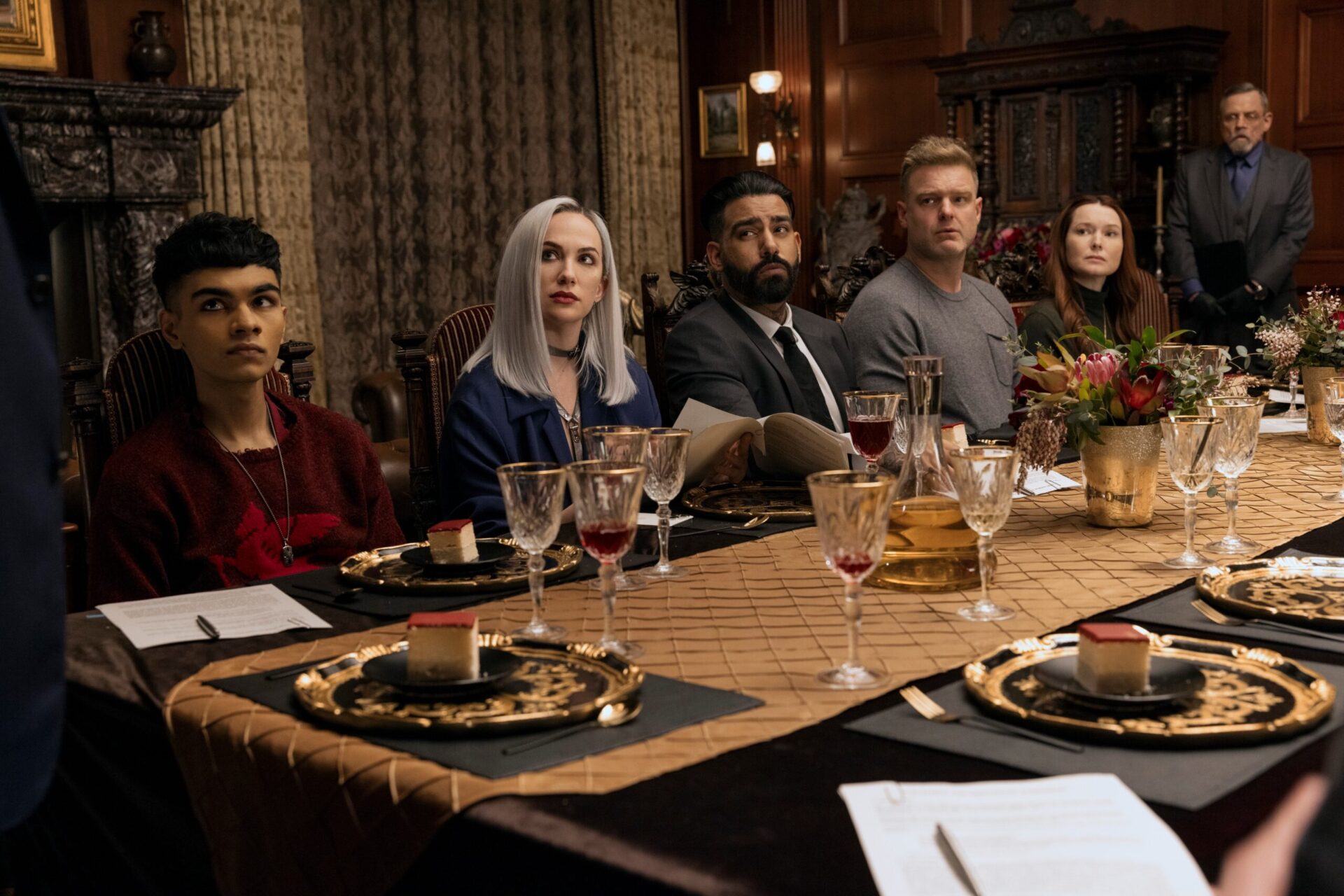
But more than that, it allows the show to transcend itself, and comment on Big Issues without ever feeling like a show that Comments On Big Issues. Madeline is obsessed with AI and the way it can be trained to mimic human personality, and this obsession pays off in a way that has real weight. Victorine’s work allows the show to poke at how seemingly noble medical breakthroughs are compromised by personal interest and money, and to question the ethics of animal testing. The Masque of the Red Death riff can of course be seen as a play on the current pandemic, with the masks that hide people’s identities for a consequence-free sex party being a grotesque riff on the k95’s and 3-ply medical masks that a lot of us are still wearing—but it goes beyond that to become a meditation on the carelessness of the ultrarich.
And of course the whole idea that “the House of Usher” was built on dodgy pharmaceutical work, that all of these people’s fortune comes from the pain and addiction and deaths of millions of people. People we don’t really see in the show, because they’re not consequential enough to appear, except for maybe a few journalists and groupies. The other big idea here is, hilariously, climate collapse. Because as we watch Roderick’s children die, and maybe giggle at the grotesquerie, what we’re watching is the future generation pay the bill for the previous generation’s decadence. If Roderick and Madeleine had made different choices, had thought ahead, had truly loved the children that were coming up after them, they would have thought about consequences at least a little.
But of all the Big Ideas, the two writers are inviting into a gorgeous slow tango are two of the very Biggest Questions of all: Should life be painless? Should people live forever?
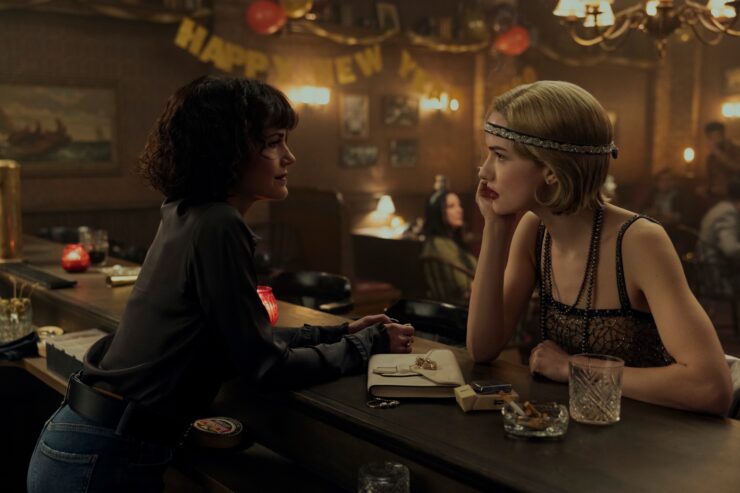
On first glance, yeah, it would be nice if no one experienced pain, and yeah, absolutely eternal life sounds cool as hell.
But then you get to, if life is truly “pain-free” how will we ever learn anything? If you never hurt yourself as a kid, how will you know to stay away from the hot stoves and the sharp corners in life? If you do injure yourself, how will you know you’re recovering if you can’t feel the signals your body is sending you? If your heart is never broken, how will you know you ever loved? If you never have to struggle in any way, how will you grow? A pain-free existence is really just an eternal womb, no?
Buy the Book
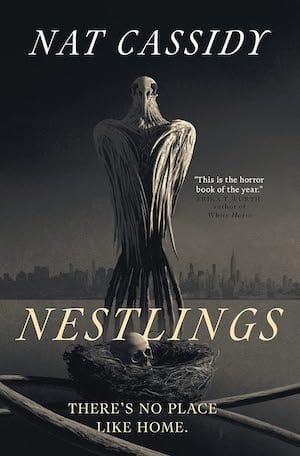

Nestlings
I am a person who has chronic shit wrong with me. If I’m awake, I’m in pain. It sucks, and sometimes I wish there was less of it, but at the same time it has shaped me in ways that I wouldn’t want to give up. It’s mine, it’s part of me, and I don’t know who I’d be without it.
In that same vein, would you want to be immortal by any means necessary? Would an AI clone of you be just as good? Would an upload of someone you love be an adequate replacement for the original? If it has the person’s thoughts and personality mapped out, would it be the same? If you’re interacting with an AI reconstruction of someone you love, how will you ever really know if its saying and thinking what the person would have thought and said? We can’t even ever know meat space versions of other people, not really—how can we expect to know their simulacra?
Several of the Usher kids have attempted to make their names by fighting entropy. Tamerlane Usher’s Goop-like holistic wellness program, GoldBug (a golden scarab) and her husband’s Peloton-like fitness empire, BillT, are designed to help those who can afford it fight the effect of aging. Victorine has built her arm of the company on an experimental implant that can, theoretically, keep a person’s heart beating indefinitely. (Maybe long past the time they want it to?) Madeline’s oft-stated goal from the time she’s in her twenties is to live forever (even though she doesn’t seem to enjoy being alive) and in her mind, the point of the Usher family is to move their company into the tech that will allow people to live on as AI. And, as in Dan Hornsby’s excellent recent eat-the-rich novel Sucker, the show riffs on the way rich people glom onto ancient cultures to make themselves feel important. Here, Egyptian imagery pops up with increasing frequency (it becomes extremely important in the finale) in everything from Tamerlane’s company name—the GoldBug is a golden scarab—to a sword Roderick wields during a business call to pump himself up, to a pair of priceless sapphires he buys his sister as a birthday gift.
It makes me so giddy that as the loose subgenre of “movies in which the rich are eaten” we’ve gotten a series that digs into what’s really at the heart of this kind of story: All these rich assholes are afraid of death. Whether they’re putting their gold-plated names on buildings or trying to hook ape’s brains to the internet or shooting themselves into space or harvesting youthful blood or simply buying community spaces so they can feel a momentary serotonin hit when they destroy them, the root of all of this is to feel powerful. To feel like they’ve cheated death. It’s such a perfect choice to tell this kind of story as a twisted slalom through Edgar Allan Poe. Taking people who want to beat death no matter the cost, and forcing their stories through the mind of a man who treated death like an irritating roommate.
Leah Schnelbach has a crush on the Raven. Come caw at them on the corpse of twitter, or BlueSky.










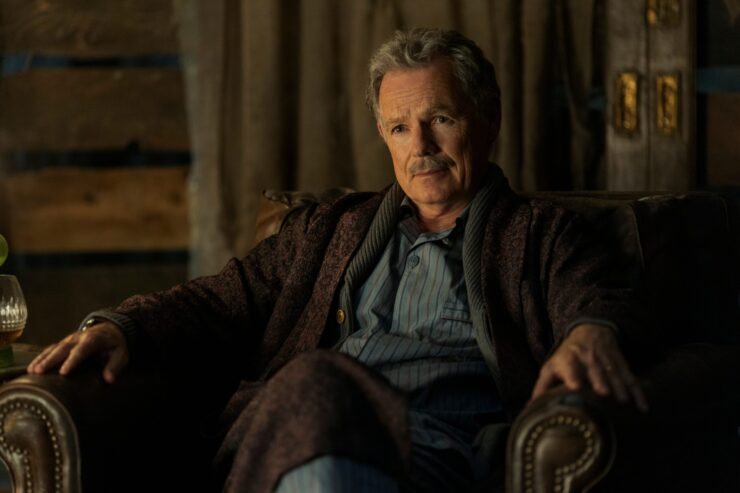
Thanks for this review of the House of Usher, which is as you wrote quite gory in blood splatters and deaths. I had no sympathy for any of the ultrarich who suffered deaths because none of them had any concern for anyone else but themselves and had a lousy reference of a father who seemed to collect wives like trophies. I don’t get why he has the last trophy wife, who doesn’t ever seem quite there since she’s always high on the product. It is a great pun on the Edgar Allen Poe stories, making them so updated to today’s world of emphasis on satisfying one’s own needs over dealing with reality.
The only issue I had with the series, which I otherwise quite enjoyed, was the fate of Lenore. It just felt like in that scene at her end she, or any of the others really, but most especially she who had not misused her privilege, should have brought up that it makes no sense for her grandfather and great aunt’s deal to hold to her. That by making the deal extend to her, the Raven (or whoever she was) was bargaining in bad faith, and allowing the two she was dealing with to make promises on behalf of others that they didn’t actually have a right to. Lenore didn’t get to make a bargain, or have a choice, things just happened to her. It might have been more interesting if she’d brought it up, been offered a bargain of her own, maybe to live a happy, if poor, life where she gets to do all the things she wants to do, but never really makes a difference in the world. And then made the unselfish choice to die so that all that good will be done in her name. It would have given her a little agency, and brought home the counterpoint she kind of represents to her family, and especially the Twin’s selfish nature.
I know that the theme is all about inherited wealth and the like, but it still would have been nice for it to be addressed by the one person in the family who wasn’t a rat bastard. Also what’s with the Rahul hate? I found him to be the only likeable member of the family, even if he was still kind of awful, he was the only one who seemed to care about anyone else in a real way. It was a nice note of humanity in an otherwise pretty cold hearted ensemble.
lol I was trying to hide spoilers in my last comment and I don’t think it worked the way I intended, my apologies.